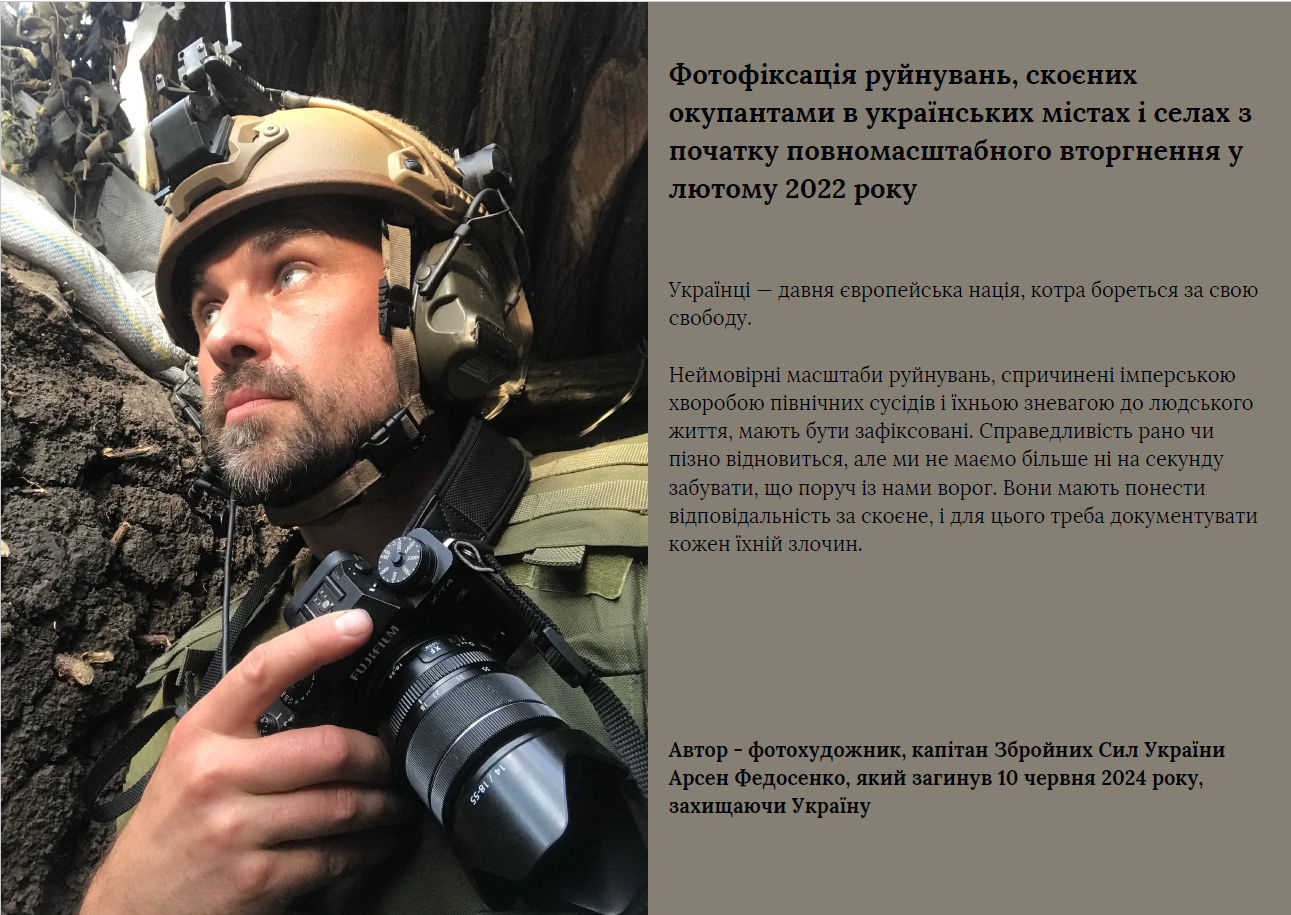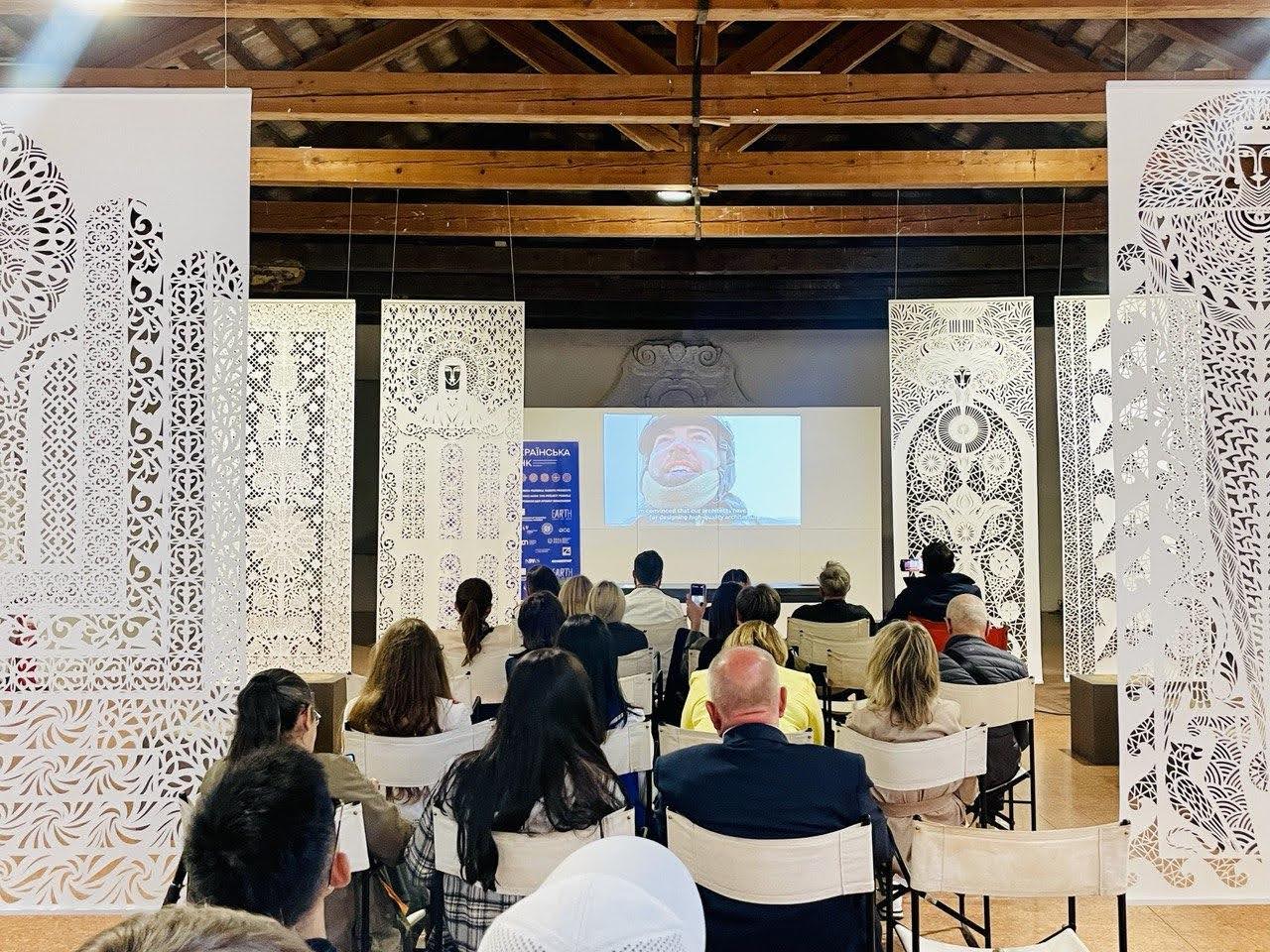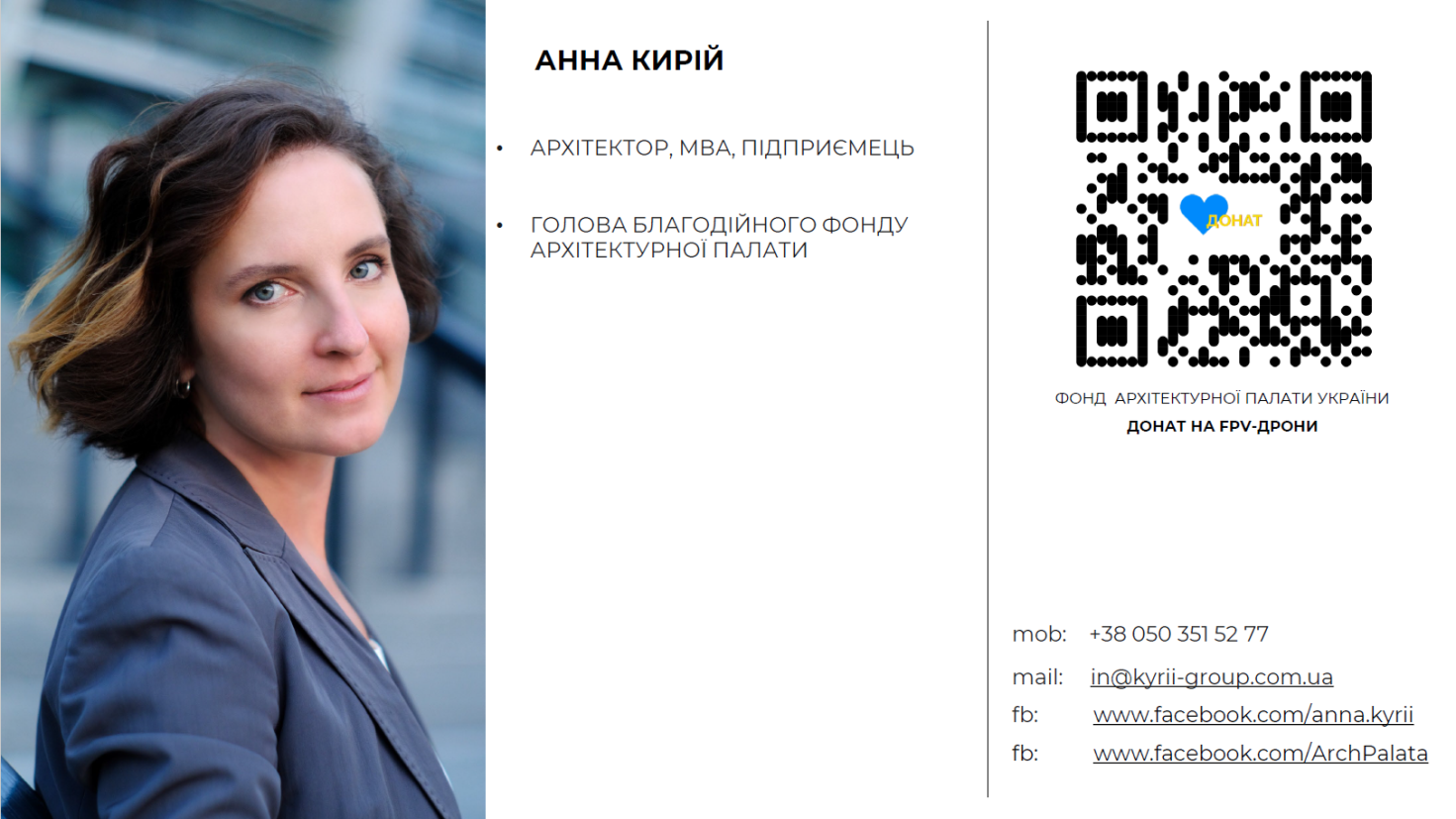The reality of a woman in wartime
A speech made by Anna Kyriy at the Summit on Partnerships and Veterans' Health held at the Ukrainian Civil Society Hub within the European Parliament, Brussels, 30 October 2024.
I speak at international conferences a lot. During the years of the full-scale war, I’ve given dozens of talks, because everyone wanted to talk about reconstruction.
I’ll begin by introducing myself. I’m an architect and entrepreneur, the owner of an architecture practice, vice president of the National Union of Architects of Ukraine, and chair of the Architectural Chamber's charitable foundation. All of these titles are a great honour, and I chose them for myself. But now another word has been added to my identity, a dreadful word – one I did not choose.
I am a widow.
My husband, Arsen Fedosenko, a well-known Ukrainian photojournalist, was killed in action on 10 June this year. Some of his photographs and his portrait are hanging in the hallway next to you.

In February 2022, Arsen volunteered for the Armed Forces of Ukraine. We queued for two weeks at the military enlistment office in Kyiv in the freezing cold days of March.
Arsen described himself like this: "I have been a member of the Armed Forces of Ukraine since spring 2022. In between my duties, I take pictures of our defenders and help the world to see Russia's war crimes and our struggle. Sometimes my portraits are the last ones ever taken of my heroes… Unfortunately, photography cannot protect against gunshots, but it may protect against oblivion and serve as an essential record...."

During those years, I attempted to look after my family, children and business, bring the architecture community together, combat corrupt officials in authority, complete reconstruction projects, and raise money for the front line. The Architectural Chamber's charitable foundation has raised UAH 10 million (approx. US$241,000) to purchase weapons rather than fund reconstruction projects.
We longed to have a dialogue with Europe. Last year, we created a Ukrainian pavilion at the Venice Architecture Biennale at our own expense and using our own resources. That was because, in my personal experience, the requisite grant programmes are ineffective. Because government assistance is ineffective. The only thing that works is interaction at the same level: Ukrainians to Ukrainians. We asked for donations for the pavilion on Facebook two weeks before it opened. We raised a hundred thousand hryvnias (about US$2,400)…
Can anyone in Europe devise a project of global significance for that amount of money? Ukrainians can.
The exhibition included a video titled "The Voice of Ukrainian Architects", in which architects serving on the front line addressed the world, each with their own message. And the international audience asked me, "Why do you have architects fighting in the war?" "Don’t you have a regular army?" Europeans could not comprehend – and it seems that they still cannot – that the whole country is fighting for the existence of the Ukrainian people as a nation.

Well, maybe not the whole country... More precisely, the best part of the country, the most patriotic people.
They are being killed, and unless Europe takes the war seriously, they may be all lost.
I deeply regret spending so much time during this war at reconstruction conferences when I could have spent more time with my husband.
These conferences seemed important to me at first, but now I steer clear of them. Because there may be no reconstruction if we lose the country, and everything is heading that way...
You know, when people offered me their condolences after Arsen’s death, they would often tell me I had to go on living for my children. Such a perplexing piece of advice… My sons are now 18 and 21. They could be mobilised or volunteer to fight on the front lines at any moment, leaving me without a husband or children.
In February 2022, my eldest son was studying in England. He had the option not to return, but he came back home. But then he was unable to complete his education because the authorities failed to develop any systems for Ukrainian students like him and closed the borders. It cost us both his education and our savings. When my son enrolled in university in Kyiv, the authorities asked for compensation for his repeat education, and we paid the rest of our savings, UAH 98,000 (US$2,300). My younger son had the opportunity to travel abroad during the war before turning 18, as many of his peers do today, but he declined to do so. Because Arsen, and I, and my children have chosen Ukraine.
At the same time, I believe that in my nation, the most discriminated-against group of people are patriotic Ukrainians. After all, we invest the most important assets in the state: our resources and our lives. Representatives of the government and parliament have addressed this conference and presented their work supporting veterans of the Armed Forces of Ukraine. I am not a veteran; I am the wife of a fallen soldier. And my experience as a widow is that for five months following Arsen's death, I received no government assistance – not one penny.
But my sons and I chose Ukraine, and we will continue to choose Ukraine, because we understand that we are the ones building it up, that it is our home and our homeland.
Now I am caught in a moral dilemma as to why I am staying in Kyiv rather than serving in the army. I know there is a desperate shortage of soldiers on the front lines. Is it that critical now to keep the firm going, to preserve the jobs, the rehabilitation projects, to support my children? Or should I perhaps hold the front line where it's most needed? Does my work as an architect, as an entrepreneur, as a mother, or even as someone who can bring communities together, justify my decision to live in Kyiv and not in a trench?
Talk of future reconstruction already sounds like a leg-pull – you cannot rely on the state; you must fund it yourself. But the situation is no better when it comes to support from Europe and the rest of the world.
It’s not just in Ukraine that the patriotic segment of society is discriminated against, but in Europe too, of which we had high hopes, but with which we are becoming more and more disillusioned. I have applied for 32 grants through the Architectural Chamber's charity. Three of those applications were turned down, and the rest went unanswered.
But we created all of those projects ourselves. We are Ukrainians. We are capable of helping one another and we rely solely on ourselves. One thing that I began to see very clearly during the war is that you can only rely on yourself to help others and your country.
Nonetheless, this is a monstrous injustice. We need long-range weapons from Europe, security guarantees, and NATO membership. And the most extreme form of cynicism is when the failure to make these decisions worldwide is attributed to Ukrainian corruption. Lack of assistance destroys only the people who are lively, creative, honest and patriotic, while the corrupt remain unharmed. They’re even given grant money, because that passes through the ministries – God knows there are plenty of corrupt officials there.
One striking example is Oleksandr Kubrakov, the former Minister of Restoration who, through USAID, succeeded in blocking funding for the urban planning law. Kubrakov has already set up his own charities, which will certainly be funded with no questions asked.
Europe supports its own aid initiatives, not ours, and its assistance is channelled through enterprises and projects that are convenient for Europe, where European experts receive funding and Ukrainians work as volunteers. European-style colonisation. At least that’s how it is in reconstruction projects. This is subjective experience – my own and that of my colleagues.
I wonder what's wrong with the world. What's wrong with your values? Because true corruption is UN Secretary General Guterres and his visit to Russia and endorsement of dictators and criminals – Putin and Lukashenko – while ignoring the Ukrainian-hosted peace summit in Switzerland. This is what corruption actually looks like. Corruption at the highest levels.
I've attended enough conferences during these years to understand clearly that Europe and the United States will only lend a hand in ways that suit them. The fact is, the world is idly looking on as we are slowly being killed, and the best they can do is find a way to help us that suits them. Convenient for you, but not what we need.
Providing weapons, cash and NATO membership, joining us in the struggle for democracy: is Europe capable of this? What would Europe do if Ukraine collapsed? When all the patriots are slaughtered, and all that’s left is a territory ruled by corrupt politicians and Russian authorities – territory that will serve as a springboard for Russia's onslaught on Europe – when your men and you yourself will be forced to take up arms – will you be queuing at the military enlistment office?
What are European values and principles worth if you cannot pay for them? Ukraine is paying in lives. The lives of people who value the state of Ukraine, who value freedom and democracy, more than their own lives.
Every night I dream that I’m sitting in intensive care next to Arsen, and he suddenly wakes up and opens his eyes. In my dream, I cry tears of joy and thank God. I'm so happy. And then I wake up to find myself in a cold bed, in the dark, facing reality. This happens every night. Last night as well. I don't know whether there is any worse torture than such dreams after which you are forced to return to reality.
A reality in which I envy amputees. Because they’re alive. You can live even if you don't have legs or arms. But it’s hard to survive with a head injury.
Or a shattered soul.
This speech should end with a call to action of some sort, but I don’t have one. Europe opts for assistance that looks good: no blood, no real weapons, and no sensitive content, just conferences with coffee breaks and lunches. I realise that we live in a post-heroic era and a consumer society where everyone wants a holiday by the sea. But Ukrainians don’t have that privilege. Either we choose blood, tears and dignity, or we die. I’m very afraid that Europe may turn a blind eye to our death the same way it did in 1933 with the Holodomor (the man-made famine in Soviet Ukraine which claimed the lives of millions of Ukrainians). And even though the war of our time is unfolding right before our eyes, Europe may overlook it due to its desire for personal comfort, avoidance of sensitive subjects, or a pre-planned holiday.
My plea to Ukrainians is: embrace the reality that you can only rely on yourselves. I'm not sure what I'd have done if I didn't have the ability to bring people together. My friends, coworkers, acquaintances and random people from social media: they donated money for the funeral, ensured a constant supply of electricity in the office, brought food, tidied up Arsen's vineyard, organised exhibitions of his photographs, and put this exhibition together. And I'm grateful to everyone who helped. This is our greatest strength. The strength of Ukrainians.
I’m going to leave a perfunctory slide here with my contact details and the QR code for our Charity. Perhaps you would like to donate some money, for us to purchase some drones. However, no one donated at any of the conferences I spoke at before.

I am well aware that you did not enjoy this speech. Neither did I, but the title of this speech promised that I would show you "the reality of a woman in wartime".
Here it is then – my reality. The reality of a broken woman who for some reason everyone else thinks is strong.
Thank you for listening.
Anna Kyriy, architect, deputy chair of the Architectural Chamber of the National Union of Architects of Ukraine, and wife of the late Arsen Fedosenko, military photographer and captain in the Armed Forces of Ukraine
Disclaimer: Columns reflect the author’s point of view and do not claim to be objective or to explore every aspect of the issues they discuss. The Ukrainska Pravda editorial board bears no responsibility for the accuracy of the information provided, or its interpretation, and acts solely as a publisher. The point of view of the Ukrainska Pravda editorial board may not coincide with the point of view of the author.
